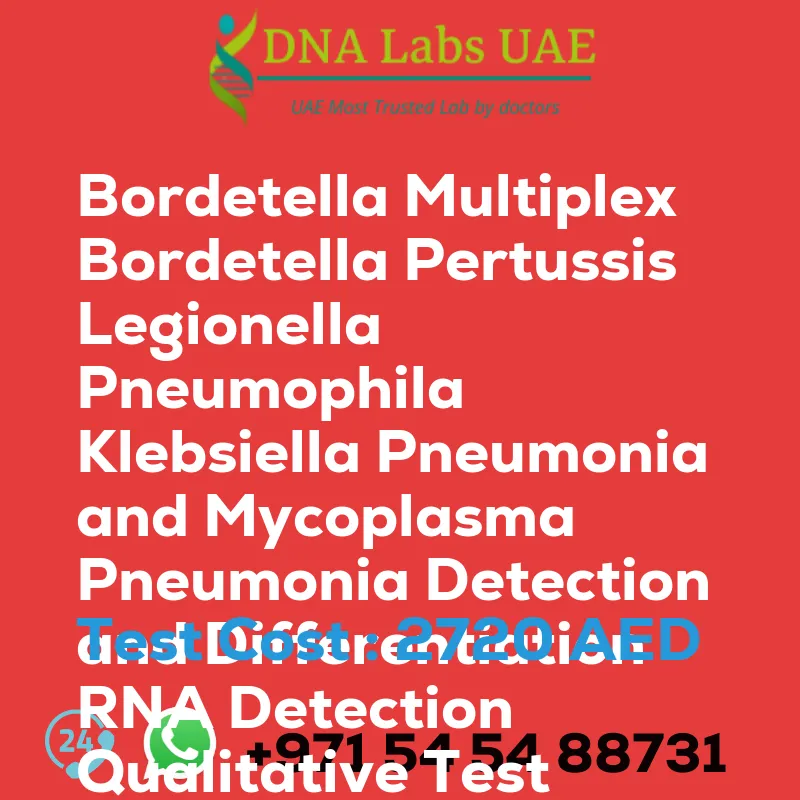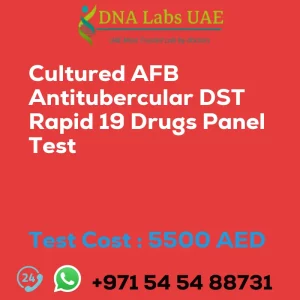Genetic Lab Blog: Bordetella Multiplex Bordetella pertussis Legionella pneumophilia Klabsiella pneumonia and Mycoplasma pneumonia Detection and Differentiation RNA Detection Qualitative Test
Test Name: Bordetella Multiplex Bordetella pertussis Legionella pneumophilia Klabsiella pneumonia and Mycoplasma pneumonia Detection and Differentiation RNA Detection Qualitative Test
Components: Price 2720.0 AED
Sample Condition: Nasopharyngeal secretions, swabs, Oral/rectal swabs and necropsy samples. Blood, Urine, Sputum, throat swab, and bronchoalveolar lavage samples, lung tissue, etc.
Report Delivery: 4th Working Day Email: 48 hours. On phone: 36 hours
Method: Real Time PCR
Test type: Viral
Doctor: Physician
Test Department: Genetics
Pre Test Information: Need to sign Consent document and bring any clinical history of patient for Bordetella Multiplex (Bordetella pertussis, Legionella pneumophilia, Klabsiella pneumonia, and Mycoplasma pneumonia) Detection & Differentiation (RNA Detection) Qualitative Test
Test Details:
The Bordetella Multiplex (Bordetella pertussis, Legionella pneumophilia, Klebsiella pneumoniae, and Mycoplasma pneumoniae) Detection & Differentiation (RNA Detection) Qualitative Test is a diagnostic test used to detect and differentiate these four pathogens in respiratory samples. This test specifically targets the RNA (ribonucleic acid) of the pathogens, which is a genetic material unique to each organism. By detecting and differentiating the RNA, the test can accurately identify the presence of Bordetella pertussis, Legionella pneumophilia, Klebsiella pneumoniae, and Mycoplasma pneumoniae in the patient’s sample. The test is qualitative, meaning it provides a simple “positive” or “negative” result for each pathogen. A positive result indicates the presence of the specific pathogen’s RNA in the sample, while a negative result indicates its absence. This test is commonly used in clinical laboratories to aid in the diagnosis of respiratory infections caused by these pathogens. Early detection and differentiation of these pathogens are crucial for appropriate treatment and management of the infections. It is important to note that this test specifically detects and differentiates the RNA of these four pathogens and may not be able to detect other related or unrelated respiratory pathogens. Therefore, it is essential to consider other diagnostic tests and clinical findings to make a comprehensive diagnosis.
| Test Name | Bordetella Multiplex Bordetella pertussisLegionella pneumophiliaKlabsiella pneumonia and Mycoplasma pneumonia Detection and Differentiation RNA Detection Qualitative Test |
|---|---|
| Components | |
| Price | 2720.0 AED |
| Sample Condition | Nasopharyngeal secretions, swabs, Oral\/rectal swabs and necropsy samples. Blood,Urine, Sputum, throat swab, and bronchoalveolar lavage samples, lung tissue,etc. |
| Report Delivery | 4th Working Day Email : 48 hours.On phone : 36 hours |
| Method | Real Time PCR |
| Test type | Viral |
| Doctor | Physician |
| Test Department: | Genetics |
| Pre Test Information | Need to sign Consent document and bring any clinical history of patient forBordetella Multiplex (Bordetella pertussis,Legionella pneumophilia,Klabsiella pneumonia and Mycoplasma pneumonia) Detection & Differentiation (RNA Detection) QualitativeTest |
| Test Details |
The Bordetella Multiplex (Bordetella pertussis, Legionella pneumophilia, Klebsiella pneumoniae, and Mycoplasma pneumoniae) Detection & Differentiation (RNA Detection) Qualitative Test is a diagnostic test used to detect and differentiate these four pathogens in respiratory samples. This test specifically targets the RNA (ribonucleic acid) of the pathogens, which is a genetic material unique to each organism. By detecting and differentiating the RNA, the test can accurately identify the presence of Bordetella pertussis, Legionella pneumophilia, Klebsiella pneumoniae, and Mycoplasma pneumoniae in the patient’s sample. The test is qualitative, meaning it provides a simple “positive” or “negative” result for each pathogen. A positive result indicates the presence of the specific pathogen’s RNA in the sample, while a negative result indicates its absence. This test is commonly used in clinical laboratories to aid in the diagnosis of respiratory infections caused by these pathogens. Early detection and differentiation of these pathogens are crucial for appropriate treatment and management of the infections. It is important to note that this test specifically detects and differentiates the RNA of these four pathogens and may not be able to detect other related or unrelated respiratory pathogens. Therefore, it is essential to consider other diagnostic tests and clinical findings to make a comprehensive diagnosis. |








